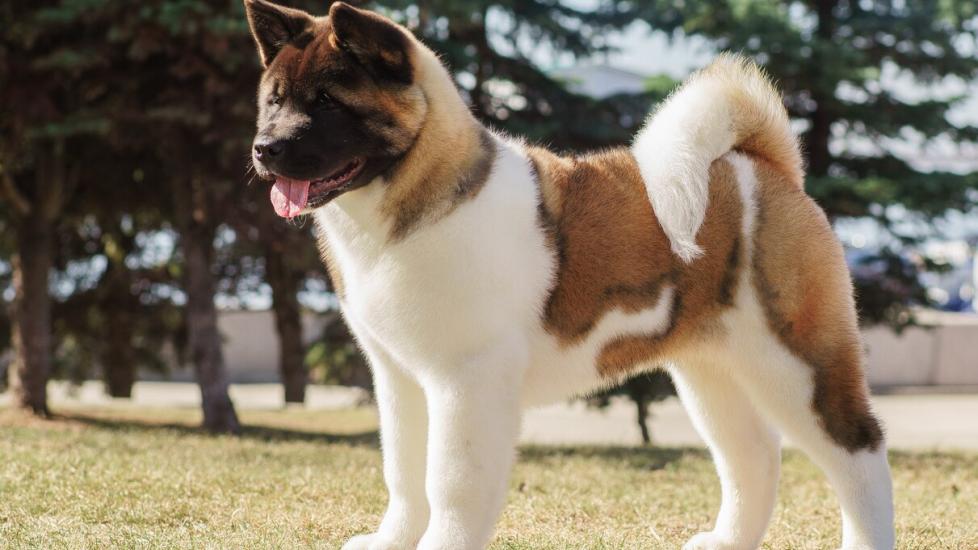Akita
iStock/Eduard_Mikrykov
The Akita is a Japanese dog breed that originally worked as a hunting dog. They’re designated as a national monument in Japan and are often associated with good health. According to the Akita Club of America, families are often gifted a statue of an Akita dog after a new baby is born or if a family member is sick.
The breed is famous for the story of Hachiko, an Akita who loyally waited nine years at a train station for his pet parent who had died.
Caring for an Akita
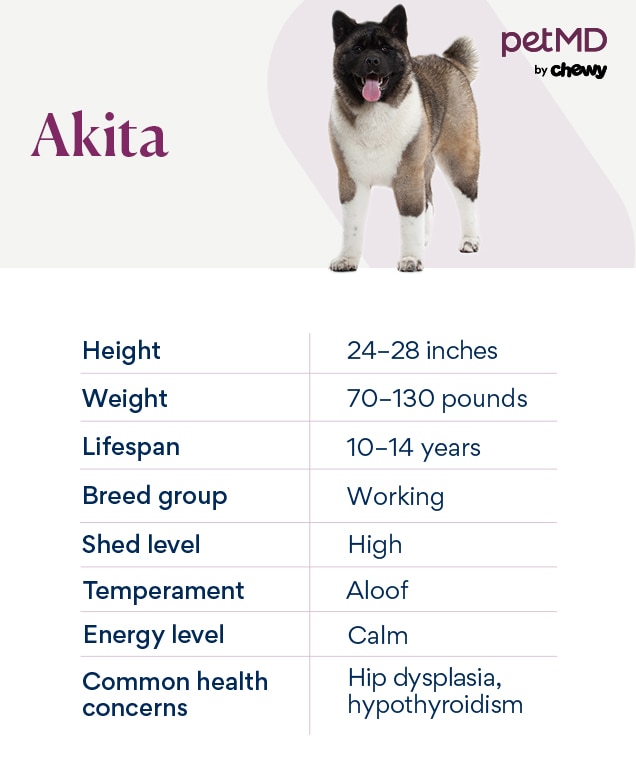
Akitas look a lot like Shiba Inu dogs: a foxlike face; pointed triangle-shaped ears; a thick, plush coat; and a fluffy tail that curls over their back. But unlike 20-pound Shibas, the Akita’s size is large—they weigh 70–130 pounds and stand 24–28 inches tall.
Akitas are strong-willed dogs bred to work independently. Because of this, they require consistent training and socialization from a young age to thrive. An experienced pet parent is best for raising an Akita puppy.
Akitas can be sensitive to heat because of their thick coat, so they would do best in a cooler climate.
Akita Health Issues
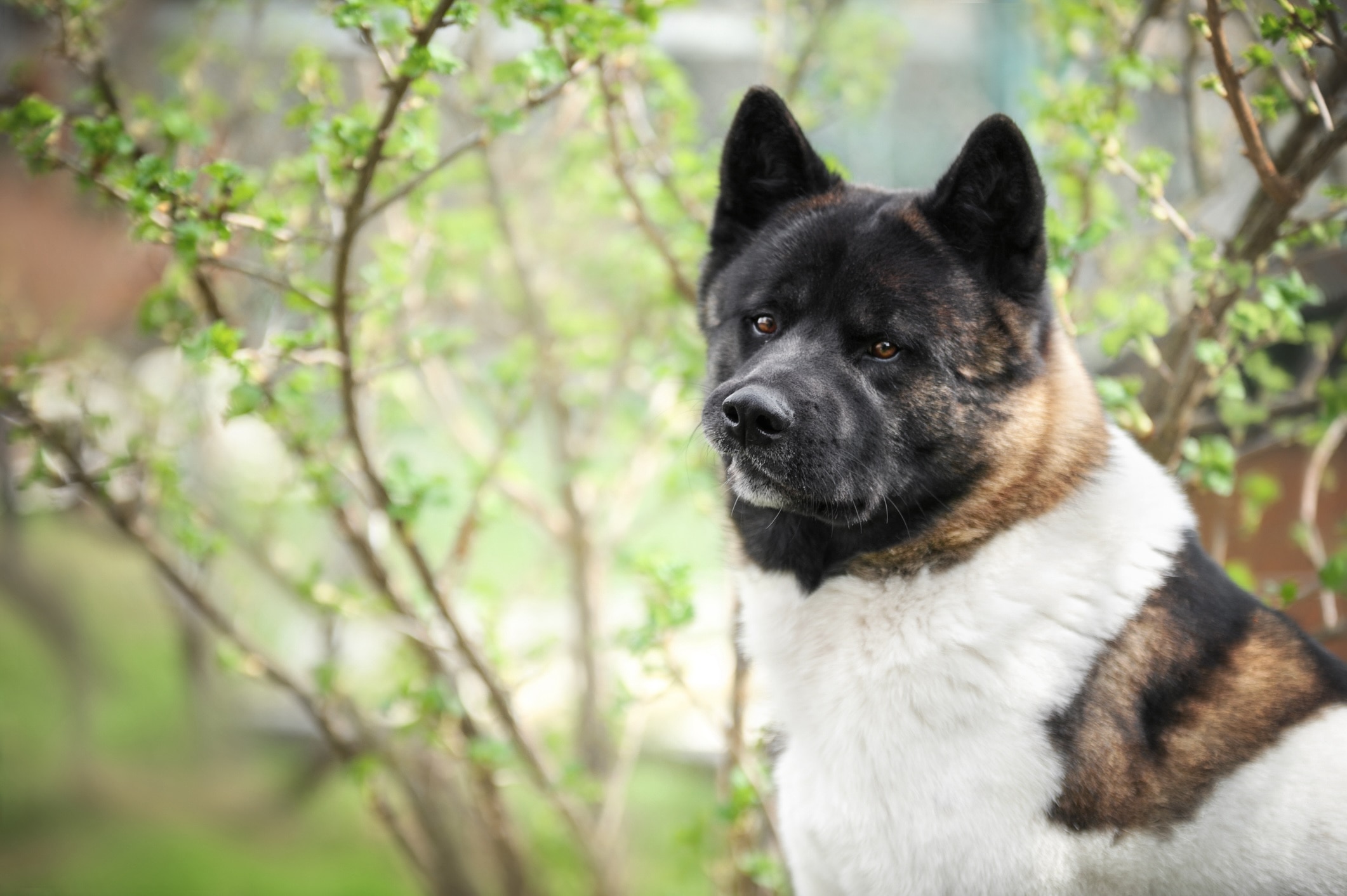
Akitas can be predisposed to joint issues—particularly hip problems. Keeping up with regular veterinary wellness exams is important to catch issues early.
The Akita lifespan is typically 10–14 years.
Hip Dysplasia
Akitas can be prone to hip dysplasia, an orthopedic condition that affects the hip joints and can lead to lameness and limping. If left untreated, hip dysplasia can cause arthritis in dogs.
If you are concerned about your Akita’s risk for hip dysplasia, talk with your veterinarian about PennHIP screening. This is a screening method that uses specialized pelvic X-rays to detect if a dog is likely to develop hip dysplasia in their lifetime.
Treating hip dysplasia in your Akita can include weight management, pain medication, and joint supplements. Severe cases of hip dysplasia may need surgery.
Hypothyroidism
Hypothyroidism, a health condition in which their body does not produce enough thyroid hormone, is common in the Akita dog breed. This condition can be screened for and monitored via routine blood work, and symptoms include:
-
Weight gain
-
Lethargy
-
Heat-seeking behavior
-
Chronic ear infections
-
Chronic skin infections
-
Dry, brittle coat
Dogs with hypothyroidism require lifelong medication, specifically an oral thyroid hormone replacement.
Eye Problems
Microphthalmia is a congenital (present at birth) disorder in which one or both eyes are smaller than usual. Typically, it’s noticed within a few days of an Akita puppy opening their eyes.
While some Akita puppies can still see out of their affected eye(s), the condition is often accompanied by entropion, retinal detachment, cataracts, or retinal dysplasia, according to the breed club. These additional problems can cause blindness.
Sebaceous Adenitis
Sebaceous adenitis is a disease that affects a dog’s skin glands, resulting in hair loss, scaly skin, dandruff, and secondary skin infections. The condition is more common in Akitas than in many other dog breeds.
There is no cure, and sebaceous adenitis needs lifelong management. Your vet may prescribe a medicated shampoo or medications to help your dog.
Bloat and Gastric Dilatation-Volvulus (GDV)
Large dogs with deep chests, including the Akita, are at an increased risk of gastric dilatation-volvulus. This is a severe form of bloat in dogs in which the stomach twists, cutting off blood flow to the organ and to the spleen.
GDV is a medical emergency, and immediate veterinary attention is needed if your Akita shows symptoms, including:
-
Retching without producing vomit
-
Pacing
-
Distended stomach
A gastropexy procedure secures the stomach to the abdomen wall, preventing it from twisting. This is often done at the same time as a dog’s spay or neuter surgery. Ask your vet if your Akita is a good candidate for a gastropexy.
What To Feed an Akita
Akitas do well with a large-breed dog food. This is particularly important when they are puppies, as large-breed puppy food ensures they don’t grow too fast, potentially causing orthopedic issues.
A dog food compliant with Association of American Feed Control Officials (AAFCO) nutritional standards will give your Akita the nutrients they need. Talk to your vet about finding the best dog food for your pup.
Their food must also be formulated for your Akita’s specific life stage: puppy, adult, or senior.
How To Feed an Akita
Feed your Akita two or three meals throughout the day, instead of one big meal. Multiple, smaller meals help reduce the risk of bloat in your dog, along with:
-
Using slow feeder bowls, lick mats, and puzzle feeders to stop your dog from eating too quickly
-
Limiting exercise one hour before or after mealtimes
-
Avoiding raised food bowls, which may increase the risk of bloat
How Much Should You Feed an Akita?
Determining the right amount of food for an Akita will in part be decided by the type of food you choose and your veterinarian’s recommendation. Since Akitas are prone to hip and joint issues, keeping them at a healthy weight through exercise and appropriate meal portions is important.
If you feel like your Akita is gaining too much weight, talk with your veterinarian to figure out an appropriate weight management plan. Obesity in dogs can make joint issues a lot worse and cause other health problems as well.
Nutritional Tips for Akitas
A healthy Akita should receive all necessary nutrients through an AAFCO-compliant dog food. But your veterinarian may prescribe your dog supplements depending on their health needs.
Never give your dog a supplement without your vet’s guidance.
Behavior and Training Tips for Akitas
Akita Personality and Temperament
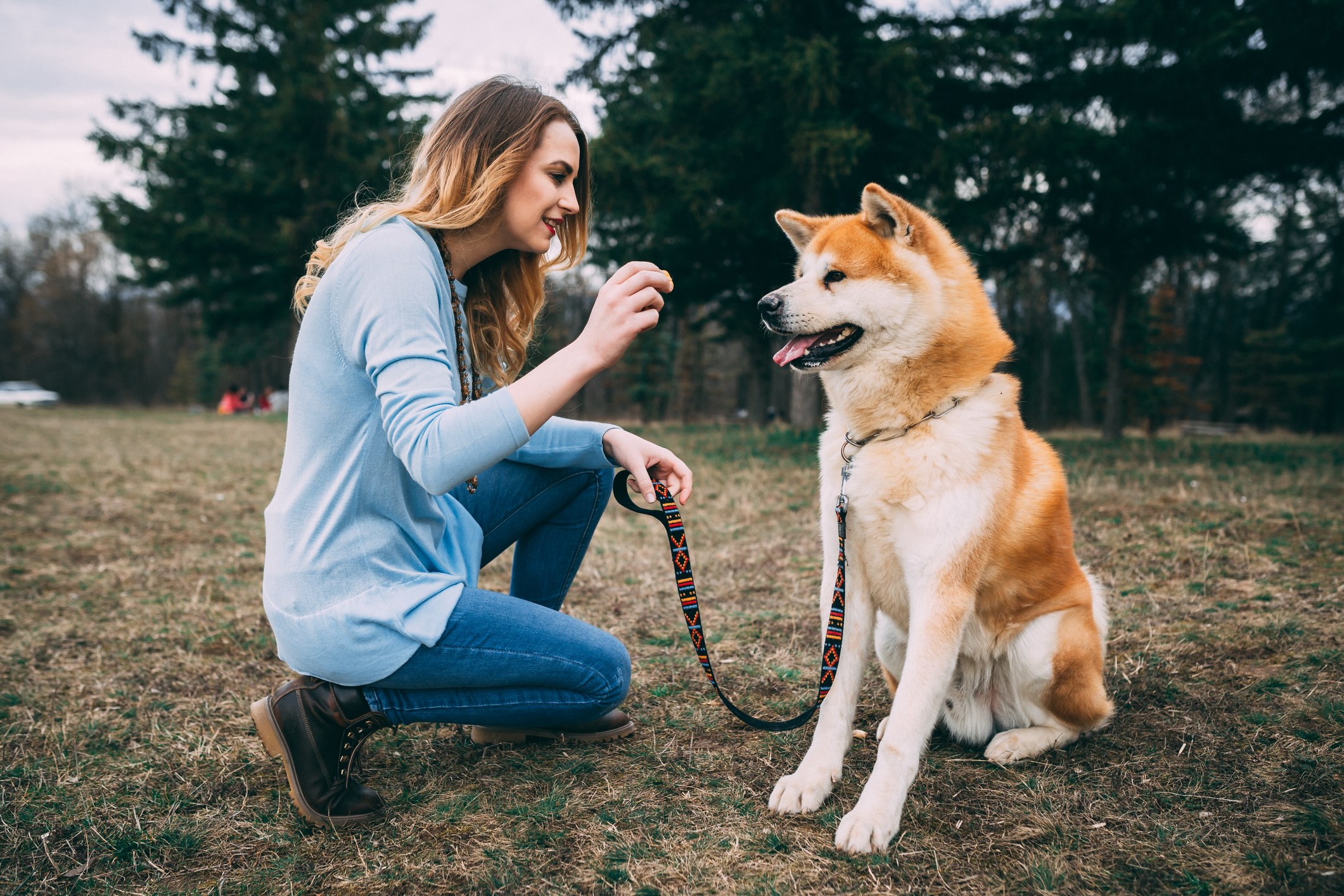
The proud and confident Akita dog breed does best in a home with experienced pet parents. They are an independent dog breed that bonds closely with their family, but they can be reserved or even uncomfortable around new people at first.
Akita Behavior
Because of their independent nature, Akita dogs may do best as the only pet at home. Their natural prey drive that stems from their hunting history means they may see smaller animals, like small dogs or cats, as something to chase after.
Akitas may also not have much patience for young children. They prefer interacting with others on their own terms, so supervise all interactions between kids and Akitas. Kids must also learn how to properly interact with dogs.
Akita Training
Begin training and socializing your Akita puppy as soon as you bring them home. This will help them grow comfortable in new situations as an adult.
They are smart dogs who can pick up obedience training cues quickly, but you’ll need to motivate them and hold their attention with the right positive reinforcement rewards. An experienced pet parent who can teach their dog good manners, like how to walk well on a leash, is best.
Fun Activities for Akitas
Akita Grooming Guide
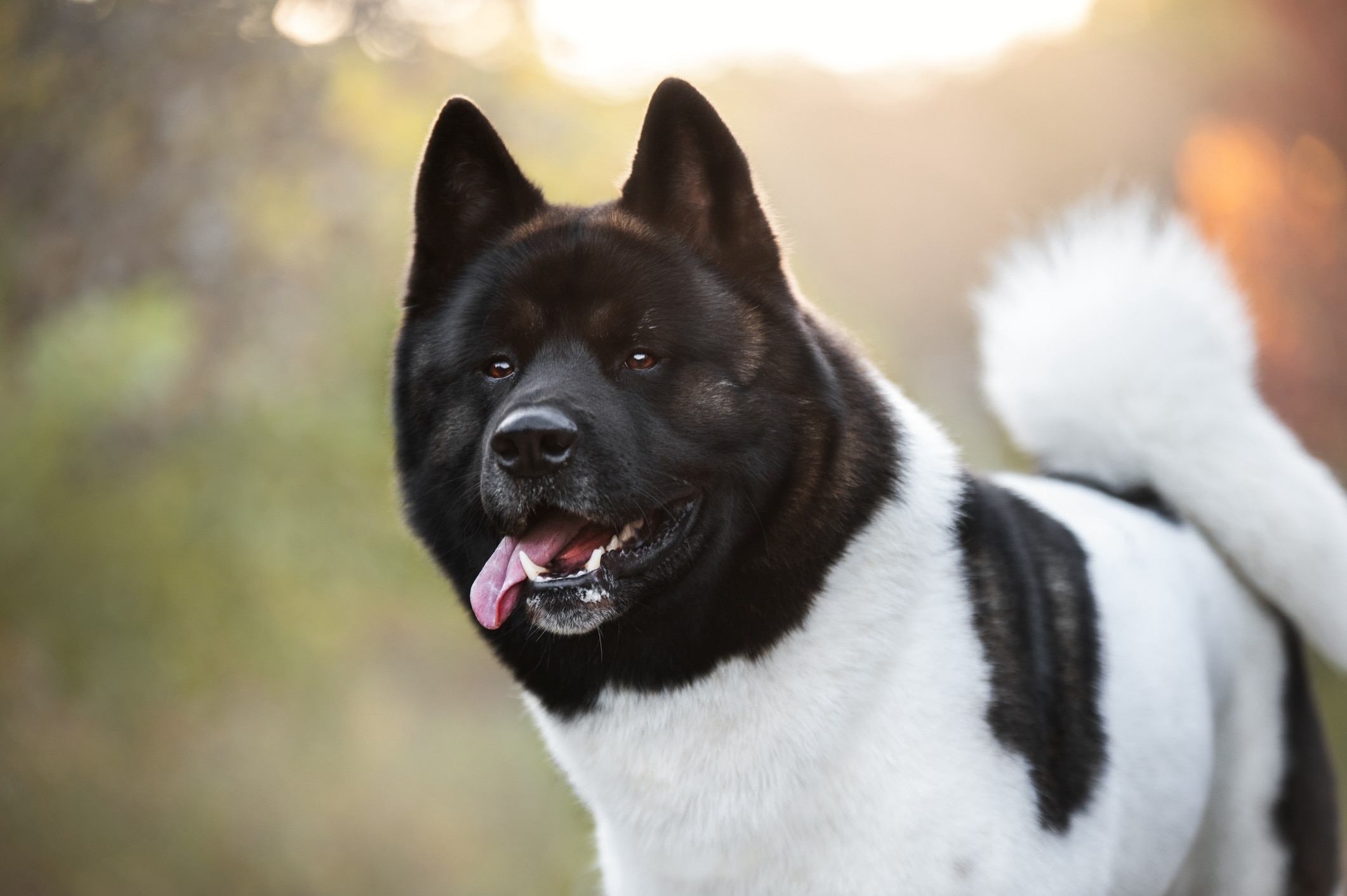
Akita dogs shed a lot, so be prepared for routine grooming. Along with their coat, special attention should be paid to their skin, eyes, and ears.
Skin Care
Akitas with sebaceous adenitis can experience recurring skin infections and other issues. If your dog is diagnosed with this condition, your vet may recommend treatments like medicated baths, diet changes, or medications.
Be alert for any changes in your dog’s skin, such as flakiness, or if your Akita itches more than normal.
Coat Care
Akitas have a thick double coat that sheds year-round, with heavy shedding in the spring and fall. Daily brushing is best to reduce shedding and prevent matting.
Eye Care
It is important to make sure your Akita’s eyes are clean and free of discharge. The breed is susceptible to several eye conditions, so contact your vet if you notice changes, such as red or cloudy eyes.
Ear Care
Akitas can also benefit from occasional ear cleanings to prevent wax buildup and reduce the risk of ear infections. Talk to your vet about how and how often you should clean your dog’s ears, and get recommendations on what ear-cleaning product to use.
Considerations for Pet Parents
The perfect home for an Akita is one with experienced pet parents who can dedicate themselves to training, socializing, and exercising their dog. This breed may do best as the only pet at home, though they may live well with other big dogs and older children when introductions are made slowly when your Akita is a puppy.
Akita FAQs
Is an Akita a good family dog?
An Akita can do well in the right family environment. When well socialized, they can do well as the only dog in a home with older children who know how to appropriately interact with dogs.
How much does an Akita cost?
The typical Akita dog price can be anywhere between $1,000 and $2,000, on average. You can also find Akitas for adoption at rescues.
What type of Akita dogs are there?
Though they are considered the same breed, there are slight differences between Japanese Akita dogs and American Akitas, as bloodlines split when the dogs were brought to the U.S. Notably, the American Akita is a bit larger than the Japanese Akita.
Akita vs. Shiba Inu: What’s the difference?
The most noticeable difference between the Akita and Shiba Inu is how big they are. The Akita dog’s size can reach 130 pounds, while a Shiba is only about 20 pounds.
Did Helen Keller introduce Akitas to America?
Yes, Helen Keller is credited with bringing the Akita dog breed to the U.S. in 1937, according to the breed club. She was gifted an Akita puppy during a tour of Japan.
